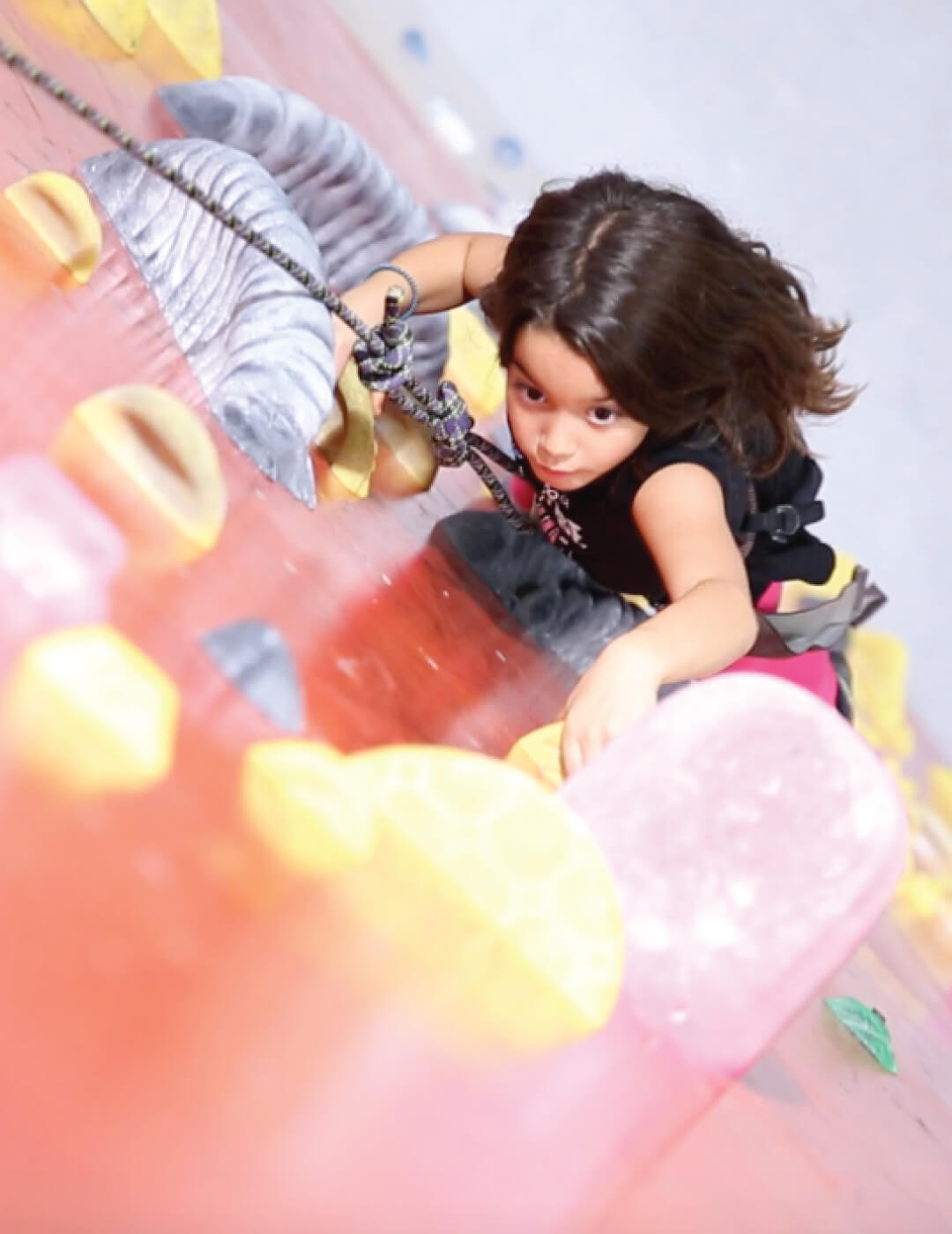Sometimes goals can feel out of reach (literally!) for everyone from the gumby to the experienced climber. That’s why we’ve outlined 5 tips to help you crush those goals you are working towards. Whether it’s a tough route you’ve been trying to send, holds you want to master, or you are just looking to build strength, these tips are helpful for all your climbing goals this spring and summer.
How to crush those climbing goals:
- Define your SMART goals
- Build a consistent training schedule
- Keep track of your progress
- Lean on your climbing community for support
- Don’t forget your rest days
Need some help making progress? Our BKB coaches are here to help you climb your best. Next time you stop by the wall let us know what goals you are working towards and how we can help.
Define your SMART goals
It’s hard to work towards a goal or goals when you don’t actually define what those goals are. Sure we all want to climb harder and stronger, but what exactly does that look like for you? Before you start building out a training routine, it’s important to define your SMART goals.
What are SMART goals?
SMART goals are Specific, Measurable, Achievable, Relevant, and Time-bound.
First, divide up your goals into one or all three main areas of climbing training: physical, technique, and mental.
Some examples for each category could be:
- Physical training: I want to build finger strength by completing a 10-second max hang 1-2 times per week. I will aim to reach a certain amount of weight on the hangboard that is safe and appropriate for my level by the end of the summer.
- Technique: As a V5 climber, I want to improve my heel hook in the next month by sending every V3 that requires a heel hook.
- Mental: I want to help manage my fear of falling by taking practice falls. I aim to take at least one practice fall every session for the next three weeks.
SMART goals like these give you specific measurements around what you are trying to achieve and make it easier to track your progress and plan your routine. Plus it gives you the confidence you need to know when you are getting close to hitting that goal.
Let’s break down what exactly makes these goals SMART…
Specific
Broad goals such as “I want to build finger strength” are hard to train for. This is because a goal that isn’t specific has no parameters around what exactly you are hoping to achieve. This leaves things open-ended and that usually results in little progress made towards that goal. Instead, let’s make that goal SMART: “I want to build finger strength by completing a 10-second max hang 1-2 times per week, reaching my goal weight by the end of the summer.”
Measurable
You should be able to measure progress towards your goal. This allows you to track your progress, have something to work towards, and know when you’ve actually accomplished it. With our “I want to build finger strength” example, it begs the question, how much strength exactly? How do you know when you’ve “built finger strength”? You might lose motivation aiming for a goal that has no way of measuring success.
Achievable
It’s important to be realistic about the goals you are setting for yourself. Unrealistic or unattainable goals will only lead to frustration, which could result in giving up. It doesn’t mean you shouldn’t dream big, but be honest about what you can realistically achieve. And if you do have big goals for yourself, set smaller attainable goals that will help you get there.
Relevant
This is all about setting goals that matter to you and are relevant to your life right now. If you have a big climbing trip coming up, it would make sense to set up a goal for that trip. But if things in your life are super hectic, it might not be the right time to set large, lofty goals. You need to be willing and able to work hard for these goals because accomplishing them will not always be easy.
Time-bound
Establishing a deadline or a period of time where you are hoping to accomplish that goal not only lights the fire beneath you to get it done, but it gives you something to focus on. Instead of that goal dragging on for years, you are giving yourself a specific allotment of time to get it done. You can always change the deadline, but it’s important to set one from the beginning so you have a date to work towards.
Build a consistent training schedule
Once you have a good sense of your SMART goal or goals that you are working towards, define how you are going to get there. Take a hard look at your current schedule and build a training routine that is going to allow you to remain consistent while being realistic with the time that you have to train.
For example, if you are a weekend warrior and most of your climbing needs to take place on the weekend, think about how you can build in shorter cross-training or strength sessions throughout the week. Or maybe you have a climbing adventure planned and you want to get in the best shape possible before that trip. Instead of waiting to train two weeks before you jet off, start building a realistic training schedule today.
For our V5 climber who is working on improving their heel hook technique, here is an example of a training schedule to help them get there:
- Monday: Hard bouldering
- Tuesday: V3 heel hook climbs
- Wednesday: Rest
- Thursday: Cross-training (such as yoga, strength training, running, etc.)
- Friday: Rest
- Saturday/Sunday: V5 Sport Climbing practice (putting heel hooks into practice on more difficult terrain)
Every climber’s routine is going to look a little bit different because everyone has different goals and schedules. The main thing that you need to keep in mind is consistency. You can’t meet a goal without consistency and long-term effort that builds on top of what you’ve been working on.
Keep track of your progress
Whether it’s a note on your phone, an app, or a journal, make sure you find a method for keeping track of progress towards your goals. Life is busy and it’s easy to forget about the goals that you set for yourself. By getting into the habit of tracking your progress, you build in a natural accountability mechanism that makes it easier to stay on target.
This way, every time you walk into BKB you have that visual reminder of where you left off, what you need to work on, and what progress you’ve made. This visual reminder is not just great for keeping track of progress, but it adds extra motivation to your workout. Last week you managed to send almost every V3 with slopers. This week, you know exactly what you need to work on to send it all.
Lean on your climbing community for support
Climbing is a social sport. We rely on our climbing community to push us to be better climbers every single day. By sharing your SMART goals with members of your crew, you can find more accountability and support to help you reach those goals. This is a lot easier than attempting to work toward your goals in isolation.
When you keep your goals private, the only person you are letting down by giving up is yourself. When you share your goals with your community, those goals become more of a reality. You might even feel a bit of added pressure to meet them. This sparks the fire of accountability and makes it harder to forget or give up on what you are working towards, especially when friends are asking how your progress is coming along.
While this can feel incredibly intimidating, remember that your BKB community is here to support you, no matter the outcome. You might even find that someone else in your climbing community is hoping to reach a similar goal. Now you have someone to train with who can help motivate you and push you forward. This could mean the difference between giving up and crushing those goals.
Don’t forget your rest days
When we have our eyes on the prize it can feel like backpedaling by taking days off. Yet, your body needs rest days just as much as you need your training days. Rest days are when your muscles grow, rebuild, and restore themselves after intense bouts of training.
Climbing challenges your body and rest is crucial to ensuring you aren’t overdoing it. Rest looks different for everyone. The best way to know when your body needs rest is to listen to the signs your body is giving you. If you feel fatigued, sore, tired, or unmotivated, it might be time to take a day off or perform a lighter activity like yoga or a long walk.
While at the moment it might feel like a step back from your goals, in the long-run rest and listening to your body is what will help you cross the finish line and check goals off your list. Not to mention that it can also help prevent injury, which would take you farther away from your goals than 1-2 days a week of rest ever will. Rest days are a great time to get some intentional breathing in. Controlling your breath on and off the wall is essential to your health and wellness. Read more about breath training for climbers.
Remember: progress is not linear
With SMART goals in hand, a consistent training schedule, a method of tracking your progress, a supportive climbing community, and built-in rest days you are going to be well on your way to crushing those goals. However, progress never happens in a straight line.
You will have good weeks and bad weeks, days you feel off, and busy schedules that get in the way of progress. You might even have days where you feel like you are getting worse and not better.
This is when it’s important to look at the big picture and remind yourself that progress is not linear and setbacks are normal. This is when all those methods of setting yourself up for success come into play.
On those bad days where your goals feel out of reach, you can look back at your written progress and see how far you’ve come. You can lean on your supportive community for guidance. You can take those rest days to recover and come back stronger. Remember, there is always failure before success.
We’ve got your back at BKB and we are ready to cheer you on. Next time you stop by, hold yourself accountable to your goals and share what you are working on with your BKB community. We can’t wait to see you crushing it on the wall!
Ready to join our community of adventurers and climbers? Connect with a Community Advisor today!




